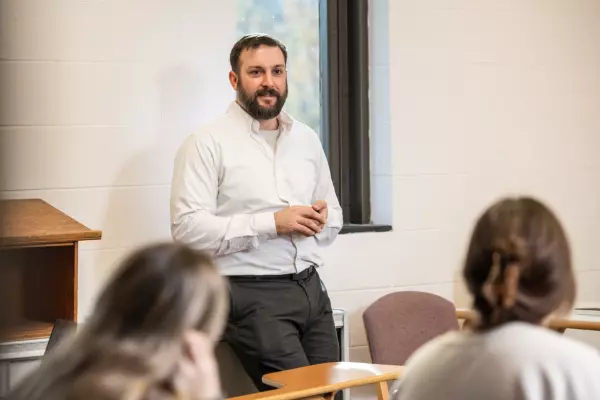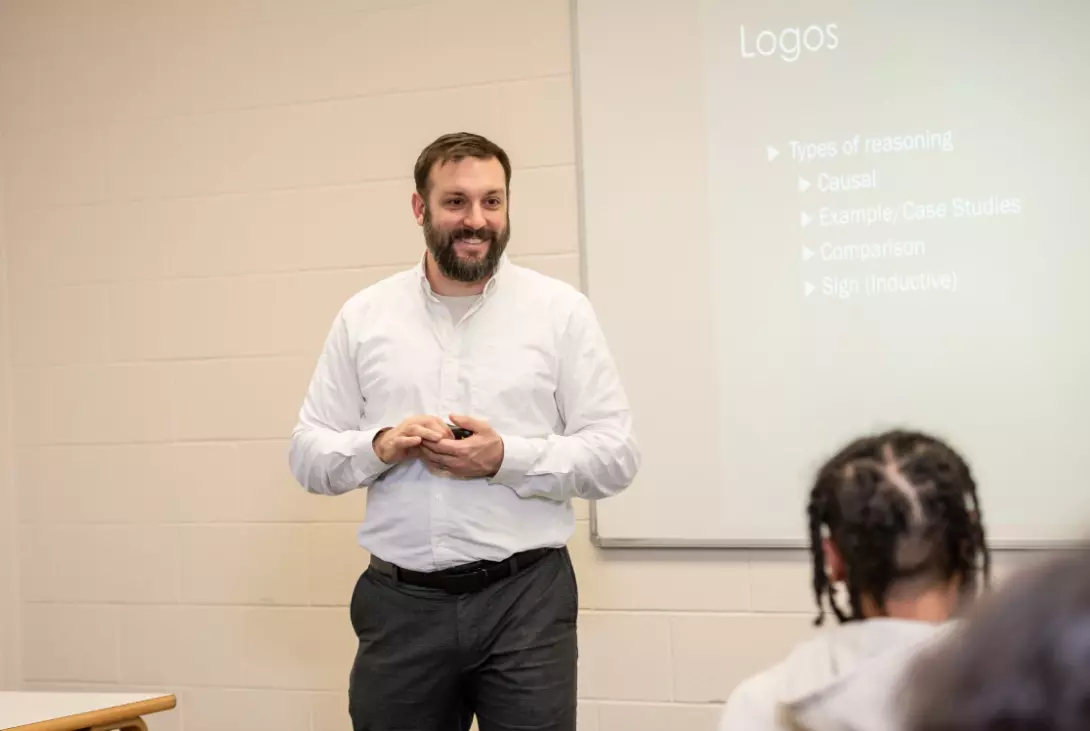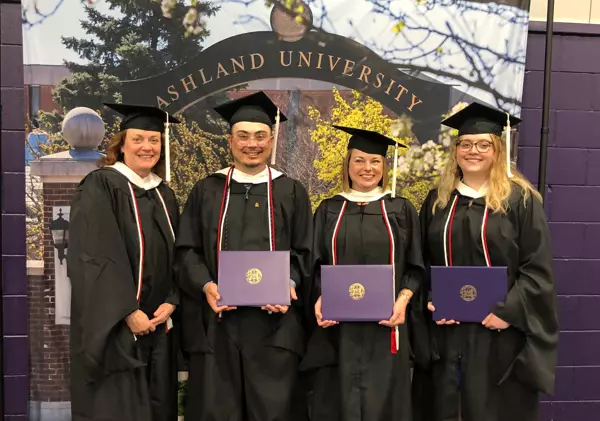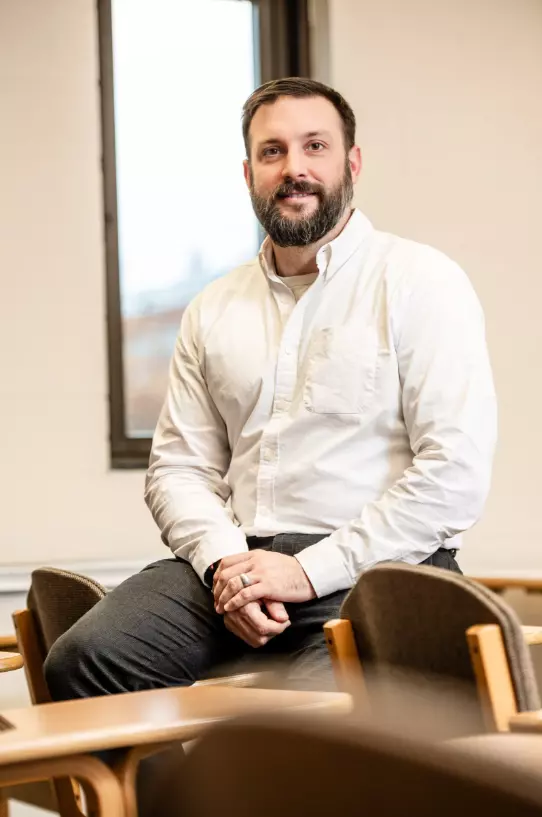
Delbert excited to be part of Communication Studies' undergrad, grad programs
Jeffrey Delbert, Ph.D., is looking forward to all the opportunities available to him as a new faculty member in Ashland University’s Communication Studies Department.
“I am excited about teaching at the master’s level and I’ve also proposed a new political communication class,” said the assistant professor, who previously taught communication at a smaller university in North Carolina for 12 years.
Delbert joins a department at AU that has many exciting things taking place, from a possible future minor in political communication to a growing master’s program. His colleagues believe Delbert will help keep that positivity going strong.
“We thought it was important to find someone with research experience in political communication,” said Cory Hillman, Ph.D., assistant professor and chair of the Communication Studies Department. “Examining the way in which we discuss politics in our hyperconnected digital world provides a lot of insight into how society actually works. Dr. Delbert has been trying to get a political communication minor approved and we think it is an option that will provide a lot of benefit to our students.”
In 2011, Delbert earned his doctorate in political communication from the University of Missouri, and has published articles and book chapters on political communication campaigns, hoping to use that knowledge to get AU students to think about how communication practices impact politics.
So far, Delbert has been working hard to accomplish that goal.
“He facilitated cross departmental conversations to create a new minor in political communication and has already submitted the proposal for senate curriculum approval,” said Professor Deleasa Randall-Griffiths, Ph.D., director of the Online Undergraduate Communications Studies program, which includes Correctional Education. “We are so lucky to have him in our department. He brings expertise and fresh perspectives to the work we do.
“He jumped right into all aspects of the job,” Randall-Griffiths added. “For example, he became a faculty senate alternate in the first few weeks of the semester. He joined the Ashland University Research and Writing Community group for new faculty and is actively engaged in scholarship.”
He even recently joined students in the AU chapter of the Public Relations Student Society of America (PRSSA) at an event in Cleveland to help them network with communication industry professionals from a variety of Ohio-based companies, including the Guardians and health-care systems.
Associate Professor Olga Monacell, Ph.D., faculty adviser of AU’s PRSSA chapter, said she appreciated that Delbert wasn’t required to attend this event, but did anyway and even drove the van that got the students to it.
Monacell said Delbert’s active involvement in this student organization enhances its members’ experiences and connections with the department.
With his bachelor’s degree in broadcast journalism from SUNY Brockport, which is close to his hometown of Buffalo, New York, Delbert didn’t originally think he would teach communication.
“I was going to be a television meteorologist and was taking communication classes and found out I really didn’t like meteorology as much as I thought, so I swung to communication,” said Delbert, who worked for SUNY Brockport’s IT Department for a few years after his undergraduate schooling. “Anything that is information related I’ve always been interested in and I am really interested in how we share information to coordinate and shape meaning. I’ve worked hard to become a communication scholar.”

Delbert to teach master-level classes in the spring
Delbert, who earned his master’s degree in communication from SUNY Brockport near Rochester, New York, will teach in the department’s graduate program in the spring.
After one year at AU, Monacell, who was hired in 2021, took over the Master of Arts in Strategic Communication and Leadership program, which was created about a decade ago focusing only on health and risk communication.
“A number of revisions have occurred since that time seeking the right curriculum to fit our target student pool,” said Randall-Griffiths, who has been teaching at AU since the mid-1990s. “Olga found the perfect blend of strategic communication and leadership to meet the needs of our students.
“In the past years, courses were mostly taught by adjuncts from other campuses,” Randall-Griffiths added. “One of Olga’s priorities is tapping into the expertise of our full-time faculty to strengthen the program. That priority benefits both the students and faculty.”
Randall-Griffiths said she is excited to expand her teaching next semester to the graduate level for the first time.
Ashland University’s graduate program targets students who, after earning their bachelor’s degree, have worked for a few years and are interested in advancing their careers.
The Master of Arts in Strategic Communication and Leadership program is online and classes can be taken at a student’s desired pace.
While it’s open to anyone – some AU undergrad students are taking classes – Monacell said the program works best for working professionals, including high school teachers who would like to teach College Credit Plus (CCP) classes.
Shawn Orr, dean of eAshland and instructor of communication studies, helped get a grant for CCP students to earn certificates in the MA program.
Some CCP teachers who took advantage of the grant to pay for a graduate certificate, might decide to continue in the program and get their master’s degree, Monacell said.
“Several of our alumni work for large organizations that paid for their graduate classes,” Monacell said. “A few employees of Ashland have also earned their master’s degrees in our program.”

AU employees complete Communication Studies' master's program
Two AU employees who have gone through the program are Sarah Swaisgood, grant writer, and Caleb Crowly, director of creative services for the Athletics Department.
Swaisgood said she chose to enroll in the program for several reasons, mainly to become a more effective grant writer.
“The program taught me to approach communication with a focus on research and understanding the target audience — skills that are needed for conveying an organization's message effectively,” Swaisgood said. “The curriculum was structured in a way that allowed me to balance work, family and coursework. It’s definitely possible to complete this program while working full time.”
Crowley said he took it because he wanted to learn the theories behind what he does with social media marketing in his job and develop them further.
“The courses gave me confidence in myself and my abilities,” Crowley said. “I was suddenly able to give a name to the theories I was naturally already using at a novice level. I recognized where some of my shortcomings were coming from and was given the tools necessary to self-critique and teach myself going forward. It has made me a better employee, director, leader and communicator.”
Department chair excited about master’s program, adding Delbert
One of Hillman’s favorite experiences teaching in the Communication Studies Department’s master’s program is receiving emails from students who share how much they have benefitted from the program, he said.
“These students will play a big role in helping us market the program by what they say about it,” Hillman said. “I feel confident that the program will continue to grow in popularity. It is an asset for our department.”
Hillman said Delbert is another asset to the department who he expects will help the department grow both its undergraduate and graduate programs.
“When Jeff did his teaching presentation as part of his on-campus interview, he connected with students well,” Hillman said. “Teaching today is probably more complicated than it has been historically, but Jeff seemed to make it look easy as you could tell students were engaged and interested. We knew he would be a good fit for our department.”
